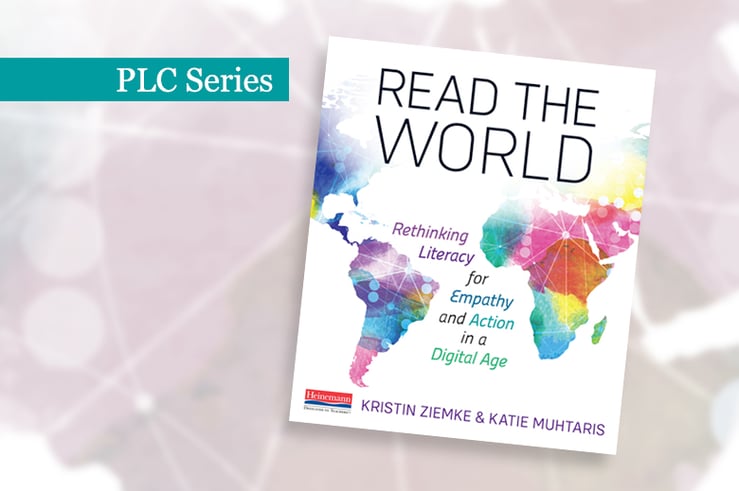
Welcome back to the Heinemann Professional Development Professional Learning Community (PLC) series.
Each month, we'll share a post designed to provoke thinking and discussion, through a simple framework, incorporating mini-collections of linked content into your professional development time.
This month, our post focuses on effective and thoughtful planning for students to apply a variety of strategies as they interact with myriad texts across the day, both print and digital.
♦♦♦♦
Note: For this post, we will use an expanded definition of text, one that defines text as any type of information from which we need to make meaning: any combination of print, digital, video, face-to-face interactions, audio, etc. To hear Katie and Kristin talk more about an expanded definition of text, visit the companion resources for their book, Read the World: Rethinking Literacy for Empathy and Action in a Digital Age.
by Jaclyn Karabinas
![]() Connect
Connect
Think through your day, from waking to sleeping, and jot down types of texts from which you make meaning as you consume information across settings. Consider conversations on the commute, podcasts, social media, articles, schedules, daily plans and so on.
![]() Consider
Consider
If we want to teach students to apply a range of strategies to make meaning from a range of texts, we need to be strategic about what this means for curriculum & instruction.
Keep this guiding question in mind as you read today: As teachers, how can we be thoughtful with our planning so we provide the instruction and experiences students need to effectively interact with a wide range of texts?
![]()
Educate
Let's hear from the coauthors of Read the World, Kristin Ziemke and Katie Muhtaris. In this clip, Kristin and Katie share thinking about the balance between the creation of content and the critical consumption of content.
![]()
Reflect
Remember that we are focusing on how we might be thoughtful with our planning. What do the authors suggest in this video? What types of thoughtful planning go into providing students a wide range of entry points and texts?
![]()
Practice
In their book, Kristin and Katie provide a wealth of resources for you to thoughtfully plan for what you need to do, and what the students will do. Click here to view their Digital Literacy Lesson Planning guide, one of the many downloads available in the book’s companion resources.
This planning guide begins by asking you:
- With what resources will students need to interact?
- What strategies and skills do students have now?
- What strategies and skills do they need in order to be successful with this resource(s)?
- How can you break that down for students in a visible way?
- Which lessons would be appropriate for all students? Which for some students? Which for a few students?
- Which lessons might transfer to a digital medium to help students? What new lessons might you need to teach?
Notice that this process helps you determine how many texts and entry points of information you will need, what lessons can be whole-class and which ones might need to be small group, and which strategies might need to be reinforced for a print medium, yet be slightly revised for a digital medium.
![]()
Extend
Katie and Kristin believe in “Yes, AND….” when planning for print and digital resources to support learning goals. While certainly there was a time when technology was not easily available for teaching and learning, considering the access, perspectives, and differentiation opportunities available now, it can provide help for us in planning rich learning experiences for all learners, using markers and paper AND devices. Take a look:
![]()
Refine
If our goals include helping students read a wide range of texts to strengthen numerous skills, make meaning, and take action, we have to plan with these goals in mind. We know where to find and curate our print materials: school and classroom libraries, classroom sets of curriculum texts, and magazines, but how can we effectively plan for digital resources without searching all day?
Katie and Kristin created a list just for you, available here alongside their book’s companion resources.
![]()
Act
It’s time to dive in! But first, you need some colleagues to maximize planning for your next unit. Be sure to think through the kinds of reading and writing strategies students will need across all text and tech types. Plan for modeling, inquiry into materials, scaffolds, and ways for students to collect thinking. Plan your lessons around goals, not tech, and use your carefully curated resources and planning to give it a go.
For further reading:
ILA: Beyond Text Literacy for a Digital Culture by Kristin Ziemke and Don Goble
♦♦♦♦
Looking for more PD?
Online: We have an amazing schedule of webinars this season AND a catalog of flexible, on-demand courses to choose from—take a look!

Off-Site: Our workshop and institute season continues as our authors appear around the country. Check out who might be coming to your area this spring!
On-Site: Heinemann’s Speakers & Consulting Authors are thought leaders in how to create successful classroom and school environments based on respect, collaboration, empathy, and positivity.




